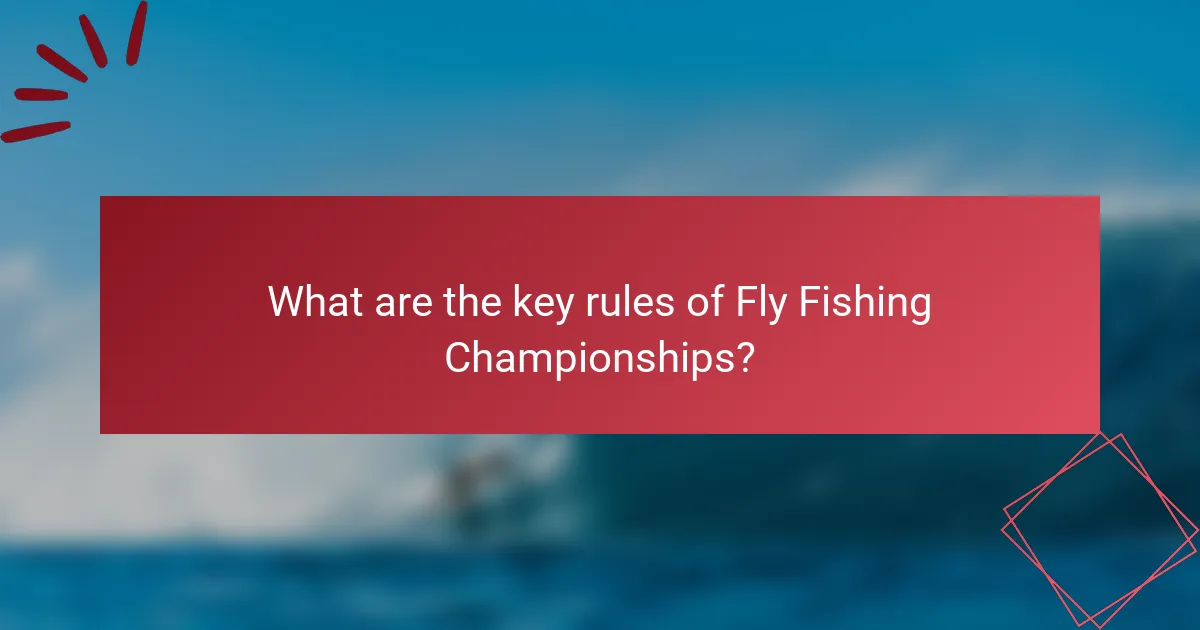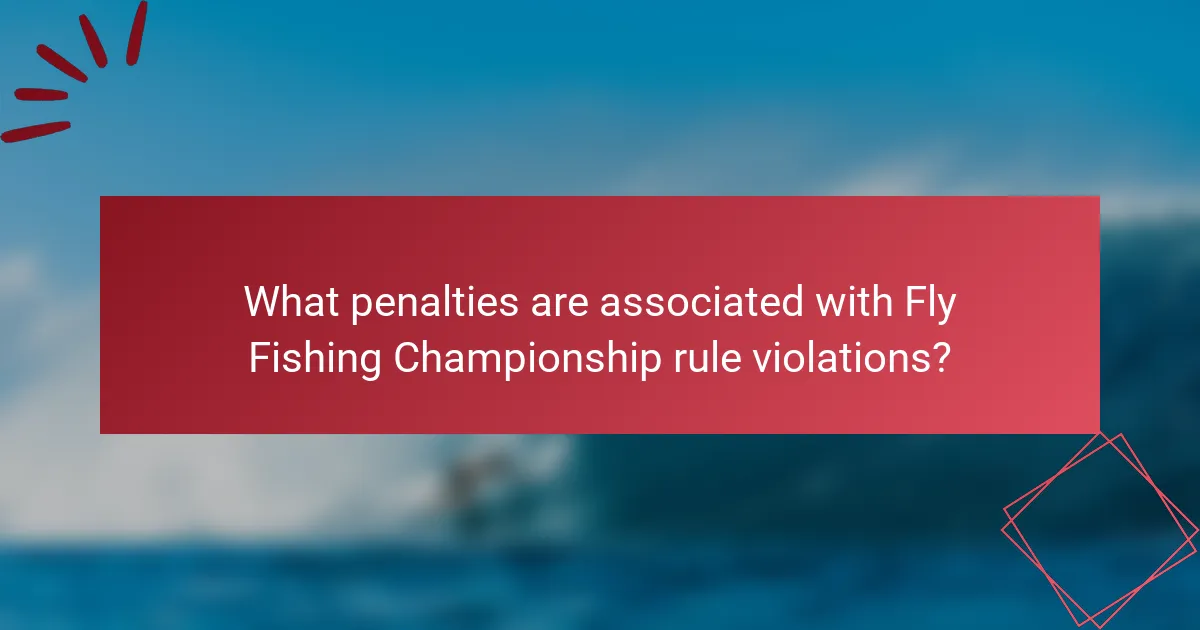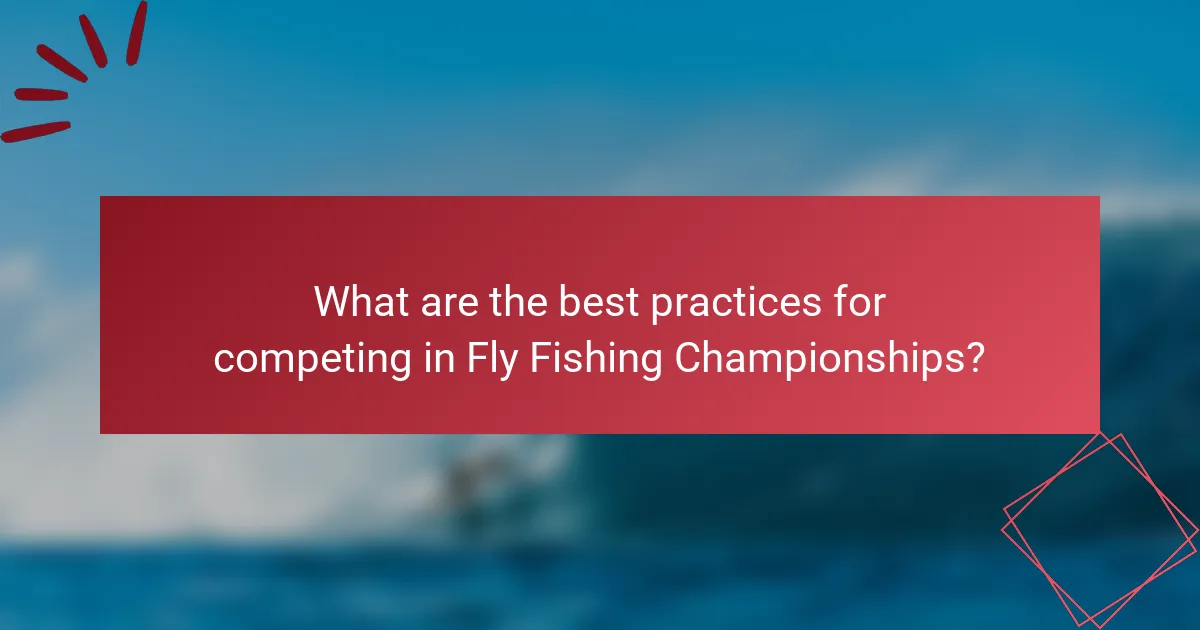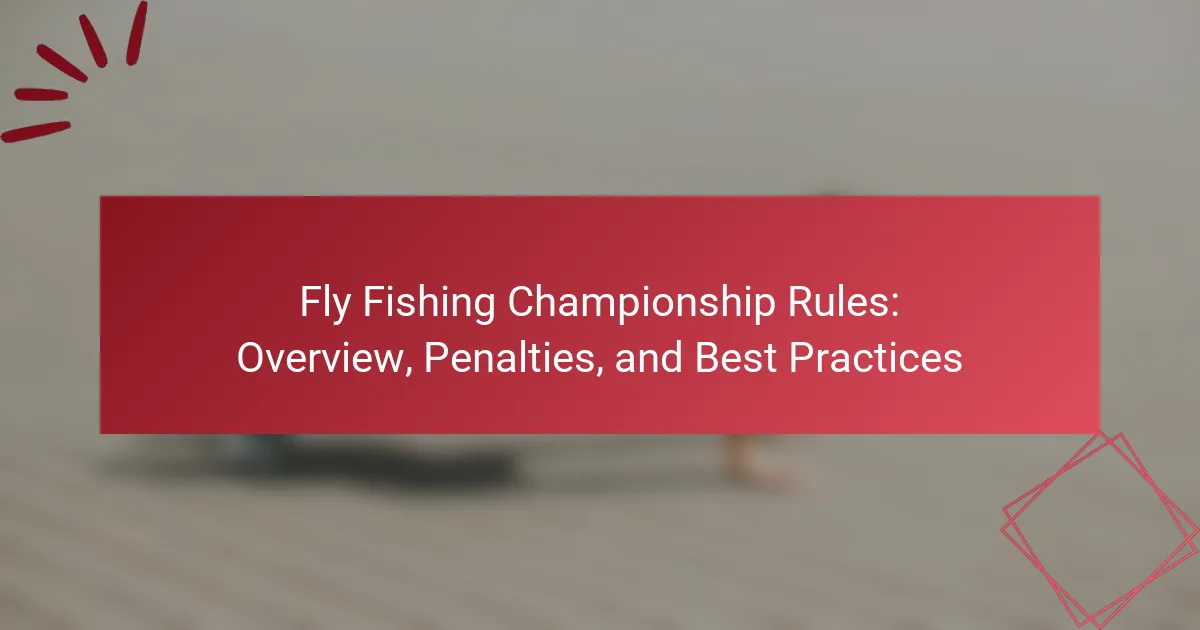Fly Fishing Championships are governed by specific rules that dictate equipment standards, casting techniques, and catch-and-release practices. Participants must adhere to tournament specifications for fly rods and reels, remain within assigned fishing areas, and follow a catch-and-release policy to promote sustainability. Scoring is based on the length of fish caught, with penalties for rule violations potentially leading to disqualification or point deductions. To succeed, competitors should focus on preparation, technique, and strategy, including understanding local conditions, selecting appropriate flies, and maintaining composure during the competition. Insights from experienced anglers highlight the importance of adaptability and thorough preparation in achieving success in these championships.

What are the key rules of Fly Fishing Championships?
Key rules of Fly Fishing Championships include specific guidelines on equipment, casting techniques, and catch-and-release practices. Participants must use fly rods and reels conforming to tournament specifications. Each angler is typically assigned a designated fishing area, and they must remain within those boundaries. Competitors are required to follow a catch-and-release policy, ensuring that all fish caught are returned to the water unharmed. Scoring is based on the length of fish caught, with the longest fish receiving the highest points. Time limits are enforced, often ranging from a few hours to a full day. Violations of these rules can result in penalties, including disqualification from the competition. These regulations ensure fairness and promote sustainable fishing practices.
How are the rules structured for Fly Fishing Championships?
Fly Fishing Championships have specific rules structured around competition format, scoring, and conduct. Competitors typically fish in designated zones within a set time limit. Each competitor’s catch is measured and recorded, with points awarded based on size and species. The scoring system often prioritizes catch-and-release practices to promote conservation. Rules also include guidelines on equipment, such as fly types and rod specifications. Penalties may apply for rule violations, including disqualification for unethical practices. These regulations ensure fair competition and adherence to environmental standards. The structure is designed to maintain integrity and promote sportsmanship among participants.
What are the primary categories of rules in these championships?
The primary categories of rules in fly fishing championships include competition format, fishing methods, and conduct regulations. Competition format outlines the structure of the event, including time limits and scoring systems. Fishing methods specify the allowable techniques, such as fly types and casting styles. Conduct regulations govern the behavior of participants, ensuring fair play and sportsmanship. These categories ensure a standardized and fair competition environment for all anglers.
How do these categories impact the competition?
Categories in fly fishing championships significantly impact competition outcomes. They define the rules, techniques, and eligible species for participants. Specific categories can limit the types of gear or methods allowed. This can create an uneven playing field if some competitors are more skilled in certain categories. Additionally, categories influence scoring systems and penalties for infractions. For example, a category focused on catch-and-release may impose stricter penalties for mishandling fish. Thus, understanding these categories is crucial for competitors to strategize effectively. Competitors must adapt their skills to excel within the defined parameters of each category.
Why is adherence to rules important in Fly Fishing Championships?
Adherence to rules is crucial in Fly Fishing Championships to ensure fair competition. Rules provide a standardized framework for all participants. This framework promotes equality among competitors. It prevents disputes over techniques and methods used during the competition. Adhering to rules also ensures the safety of all participants and the preservation of the environment. Violating rules can lead to penalties, which can affect rankings and outcomes. A consistent application of rules maintains the integrity of the championship. This integrity is vital for the sport’s reputation and future growth.
What are the consequences of rule violations?
Consequences of rule violations in fly fishing championships can include disqualification from the event. Violators may also face penalties such as point deductions or fines. These consequences serve to uphold the integrity of the competition. Historical data shows that strict enforcement of rules maintains fair play among participants. Disqualification can prevent a competitor from winning awards or recognition. Penalties can vary based on the severity of the violation. Repeat offenders may face harsher consequences in future events. Overall, these measures ensure adherence to established guidelines within the sport.
How do rules ensure fair play among competitors?
Rules ensure fair play among competitors by establishing clear guidelines that govern behavior and actions during competitions. These rules define acceptable practices and prohibit unfair advantages. For instance, regulations may limit the types of equipment used, ensuring all participants have equal access to resources. Additionally, rules often include penalties for violations, which deter cheating and promote integrity. Historical data shows that structured rules in competitive environments significantly reduce disputes and enhance participant satisfaction. In sports, adherence to rules fosters a level playing field, encouraging healthy competition and respect among competitors.

What penalties are associated with Fly Fishing Championship rule violations?
Penalties for Fly Fishing Championship rule violations can include disqualification from the event. Violators may also face point deductions based on the severity of the infraction. In some cases, a temporary or permanent ban from future competitions may be imposed. These measures ensure fair play and adherence to established guidelines. Specific penalties can vary by tournament and governing body. For example, the International Game Fish Association outlines penalties in their competition rules. Adherence to these rules is crucial for maintaining the integrity of the championship.
What types of penalties can participants face?
Participants in a fly fishing championship can face several types of penalties. Common penalties include disqualification from the event for rule violations. Additionally, participants may receive point deductions for infractions such as using illegal equipment. There are also time penalties for exceeding allotted fishing periods. Violations of catch and release rules can incur further penalties. Each event may have specific guidelines detailing these penalties. These rules are enforced to maintain fair competition and sportsmanship.
How are penalties determined based on rule infractions?
Penalties for rule infractions in fly fishing championships are determined based on the severity of the infraction. Minor infractions may result in warnings or small point deductions. More serious violations can lead to disqualification from the event. Each championship establishes its own guidelines for penalties. These guidelines are typically outlined in the official rulebook. Penalty assessments consider the context of the infraction and the intent of the angler. Historical precedents from previous championships often influence penalty decisions. Consistency in enforcement is crucial to maintain fairness in competitions.
What is the process for appealing penalties in Fly Fishing Championships?
The process for appealing penalties in Fly Fishing Championships typically involves submitting a formal appeal to the event’s governing body. Competitors must adhere to specific guidelines outlined in the championship rules. The appeal usually requires a written statement detailing the reasons for the appeal. This statement must be submitted within a designated timeframe after the penalty is issued. The governing body will review the appeal and may hold a hearing to discuss the case. A decision will be communicated to the competitor in a timely manner. Following the established procedures ensures fairness and transparency in the appeal process.
How do penalties affect the overall competition outcome?
Penalties significantly impact the overall outcome of fly fishing competitions. They can lead to disqualification or point deductions for competitors. For instance, a competitor may lose points for violating specific rules, such as using prohibited gear. This can change their ranking and affect their chances of winning. In some cases, penalties can also influence the strategies competitors adopt during the competition. Competitors may adjust their techniques to avoid potential penalties. Overall, penalties create a direct correlation between rule adherence and competitive success. This dynamic emphasizes the importance of understanding and following championship rules.
What are the common scenarios leading to penalties?
Common scenarios leading to penalties in fly fishing championships include violations of catch limits. Exceeding the allowed number of fish can result in disqualification. Another scenario is fishing outside designated areas. Competitors must remain within specified boundaries to avoid penalties. Additionally, using prohibited tackle or bait is a frequent cause of penalties. Each championship has specific rules regarding allowed equipment. Failure to follow these rules can lead to disqualification. Lastly, unsportsmanlike conduct can also incur penalties. This includes actions that disrupt the competition or show disrespect to other anglers. Each of these scenarios is clearly outlined in championship rules to ensure fair play.
How can participants avoid penalties during competitions?
Participants can avoid penalties during competitions by adhering strictly to the established rules. Understanding the specific regulations of the competition is crucial. Each competition may have unique guidelines regarding equipment, techniques, and conduct. Participants should familiarize themselves with these rules before the event.
Properly using allowed gear is essential to prevent disqualifications. Additionally, participants must respect boundaries and designated fishing areas. Engaging in fair play and sportsmanship is also vital to avoid penalties.
Monitoring the competition’s time limits can help participants stay compliant. Regularly reviewing any updates or changes to the rules is important. Following these best practices can significantly reduce the risk of penalties during fly fishing competitions.

What are the best practices for competing in Fly Fishing Championships?
To excel in Fly Fishing Championships, competitors should focus on preparation, technique, and strategy. First, understanding the specific rules and regulations of the championship is essential. Each competition may have unique guidelines regarding gear, fish species, and fishing methods. Competitors should practice casting techniques to improve accuracy and distance. Precision in casting can significantly impact the chances of catching fish.
Additionally, selecting the right flies based on local conditions is crucial. Researching the aquatic insects present in the area can guide fly selection. Competitors should also pay attention to weather conditions and adjust their strategies accordingly. For instance, fish behavior changes with temperature and weather patterns.
Networking with experienced anglers can provide valuable insights into effective strategies. Observing and learning from past competitions can help refine techniques. Finally, maintaining composure and focus during the competition is vital. Stress can hinder performance, so practicing mindfulness techniques may benefit competitors.
These best practices are supported by the experiences of successful anglers in various championships. Many champions emphasize preparation and adaptability as key factors in their success.
What strategies can enhance performance in Fly Fishing Championships?
To enhance performance in Fly Fishing Championships, anglers should focus on technique, gear selection, and practice. Mastering casting techniques is essential for accuracy and distance. Utilizing the right fly rod and reel can significantly improve efficiency. Selecting appropriate flies based on local fish species increases catch rates. Regular practice in various water conditions builds confidence and skill. Studying the competition environment helps in understanding fish behavior. Staying updated on weather conditions can influence fishing success. These strategies are supported by experienced anglers who emphasize preparation and adaptability.
How important is preparation before the competition?
Preparation before the competition is crucial for success. It enhances skills and boosts confidence. Competitors who prepare effectively tend to outperform those who do not. Studies show that 80% of successful participants attribute their achievements to thorough preparation. Preparation includes practicing techniques, understanding rules, and strategizing. This comprehensive approach minimizes errors during the competition. Additionally, mental preparation helps in managing stress and maintaining focus. Overall, preparation is a key factor in achieving competitive success in fly fishing championships.
What role does equipment play in successful participation?
Equipment is crucial for successful participation in fly fishing championships. Proper gear enhances performance and ensures compliance with competition standards. High-quality rods, reels, and lines improve casting accuracy and distance. Specific equipment, such as fly selection, affects catch rates significantly. For example, using the right flies can increase the likelihood of attracting fish. Additionally, equipment durability is essential for handling varying conditions. Competitors equipped with reliable gear are less likely to face equipment failures during the event. Thus, appropriate equipment directly influences success in fly fishing competitions.
What tips can help participants excel in Fly Fishing Championships?
To excel in Fly Fishing Championships, participants should focus on technique, preparation, and strategy. Mastering casting techniques enhances accuracy and distance. Familiarity with the specific water conditions is crucial for success. Participants should also practice knot tying for secure connections. Understanding fish behavior aids in selecting the right flies. Time management during the competition can maximize fishing opportunities. Staying calm and focused under pressure is essential for performance. Regularly participating in practice tournaments builds confidence and skill.
How can understanding local fishing conditions improve results?
Understanding local fishing conditions can significantly improve fishing results. Local conditions include water temperature, current speed, and fish behavior. Knowledge of these factors helps anglers choose the right techniques and equipment. For example, warmer water may increase fish activity. Conversely, cold water can slow fish movement. Awareness of current speed aids in selecting appropriate fly patterns. Understanding fish behavior during different times of day enhances catch rates. Studies show that anglers who adapt to local conditions catch more fish. Therefore, mastering local fishing conditions is essential for success.
What are the key techniques to master for competitive fly fishing?
Key techniques to master for competitive fly fishing include casting accuracy, presentation skills, and line control. Casting accuracy ensures that the fly lands in the optimal position to attract fish. Presentation skills involve how the fly moves through the water to mimic natural prey. Line control is crucial for maintaining tension and managing the fly’s depth. Mastering these techniques increases the likelihood of success in competitions. Competitors often practice these skills extensively to improve their performance.
What resources are available for participants in Fly Fishing Championships?
Participants in Fly Fishing Championships have access to various resources. These include official rulebooks that outline competition guidelines. Additionally, participants can find training materials to improve their skills. Workshops and seminars are often provided to enhance techniques and strategies. Online forums and communities offer support and networking opportunities. Equipment rental services may be available for those who need gear. Local fishing organizations often provide information on regulations and best practices. Finally, mentorship programs may connect participants with experienced anglers for guidance.
How can competitors stay updated on rule changes and best practices?
Competitors can stay updated on rule changes and best practices by regularly checking official championship websites. These websites often publish updates and revisions to rules. Additionally, subscribing to newsletters from governing bodies can provide timely information. Participating in forums or social media groups dedicated to fly fishing can also offer insights from fellow competitors. Attending workshops and seminars can enhance understanding of best practices. Engaging with local fly fishing clubs can facilitate knowledge sharing. Lastly, reviewing past championship materials can provide context on evolving practices and rules.
What community resources exist for fly fishing enthusiasts?
Community resources for fly fishing enthusiasts include local clubs, online forums, and educational workshops. Local clubs often organize events and provide networking opportunities. Online forums, such as Fly Fisherman Forum, offer a platform for sharing tips and experiences. Educational workshops are frequently hosted by organizations like Trout Unlimited. These workshops cover techniques, conservation, and equipment. Many local tackle shops also provide resources and host community events. Social media groups can connect enthusiasts for discussions and meet-ups. These resources foster community engagement and knowledge sharing among fly fishing enthusiasts.
The main entity of this article is the Fly Fishing Championship, which encompasses specific rules, penalties, and best practices for participants. Key information includes guidelines on equipment, casting techniques, and catch-and-release practices, all structured to ensure fair competition and promote sustainability. The article details the consequences of rule violations, the categories of rules governing conduct and fishing methods, and strategies for excelling in competitions. Additionally, it highlights the importance of preparation, understanding local fishing conditions, and available resources for competitors to enhance their performance.
